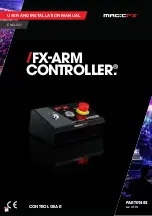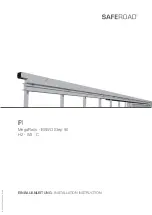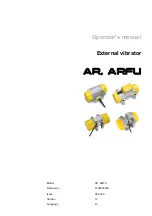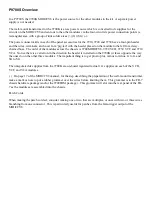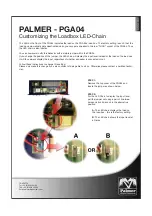
24
English
program steps (5 min to 0 .1 s) . The display will
indicate the current setting, e . g .
WT:5.78S
.
As an alternative, use the button TAP (15)
to define the speed of the program: Press the
button TAP twice; the time between the first
and the second press of the button will define
the speed of the program .
MUSIC
The program will be controlled by means of
a signal fed to the input AUDIO (28) or, if the
jack is not connected, by means of sound
pulses via the integrated microphone . Use
the buttons
and
(13) to adjust the sen-
sitivity of the audio input and the microphone
(0 to 100) . The display will indicate the current
adjustment, e . g .
SENE 050
.
MANUAL
Use the button
or
to call up the pro-
gram steps one after the other in ascending
or descending order .
4) To exit a program, press the appropriate num-
ber button again . The LED above the button
will extinguish .
5.3.3 Deleting / inserting program steps
It is possible to subsequently change created pro-
grams by deleting individual program steps or
inserting new steps into these programs .
1) Keep the button PROGRAM / REC (10) pressed
for 3 s . The LED next to the button will start to
flash to indicate that the programming mode
has been activated .
2) Press the button CHASE (7) . The LED above
the button will light up . In addition, the LEDs
above the number buttons (17) to which a pro-
gram has already been saved will start to flash .
3) Use the number buttons to select the program
to be changed .
4) Press the button INSERT (12) . The LED next to
the button will light up .
5) Use the button
or
(13) to select the pro-
gram step that is to be deleted or before which
a new step is to be inserted . The display will in-
dicate the step currently selected (
STEP
xxx) .
6) To
delete
the step, press the button DEL . All
LEDs will flash briefly to confirm the deletion .
To
insert
a new step, consecutively select and
adjust the units intended for the program step
(
☞
chapter 5 .1) or call up scenes that have
already been created (
☞
chapter 5 .2 .2) . Then
press the button PROGRAM / REC briefly . The
program step will be saved; all LEDs will briefly
flash to confirm that the program step has
been inserted .
Repeat steps 5 and 6 as required .
7) To exit the programming mode, keep the but-
ton PROGRAM / REC pressed for 3 s . The LED
next to the button will extinguish .
5.3.4 Deleting programs
1) Keep the button PROGRAM / REC (10) pressed
for 3 s . The LED next to the button will start to
flash to indicate that the programming mode
has been activated .
2) Press the button CHASE (7) . The LED above
the button will light up . In addition, the LEDs
above the number buttons (17) to which a pro-
gram has already been saved will start to flash .
3) Keep the button DEL (21) pressed and also
press the number button of the program to
be deleted . The program will be deleted; all
LEDs will flash briefly to confirm the deletion .
If required, use this procedure to delete
further programs .
4) To exit the programming mode, keep the but-
ton PROGRAM / REC pressed for 3 s . The LED
next to the button will extinguish .
5.4 Movement patterns
(MOVEMENT)
The DMX-3216 provides 16 predefined move-
ment patterns for units with controllable move-
ments (e . g . moving head, scanner) . The param-
eters speed, centre point and excursion can be
changed while a movement pattern is being
called up .
Note:
Movement patterns can only be used if the chan-
nels for movement control have been correctly assigned
(
☞
1) The LED above the button SCENE / FIXTURE
(5) must light up . If it does not light up or if it
flashes, press the button .
2) Use the number buttons (17) to select the
number of the unit that is to be controlled by
means of a movement pattern . It is possible to
select multiple units . When a unit has been se-
lected, the LED above the appropriate number
button will light up . To deselect a unit, press
its number button again .
3) Press the button MOVEMENT (6) .
Movement
will appear on the display .































